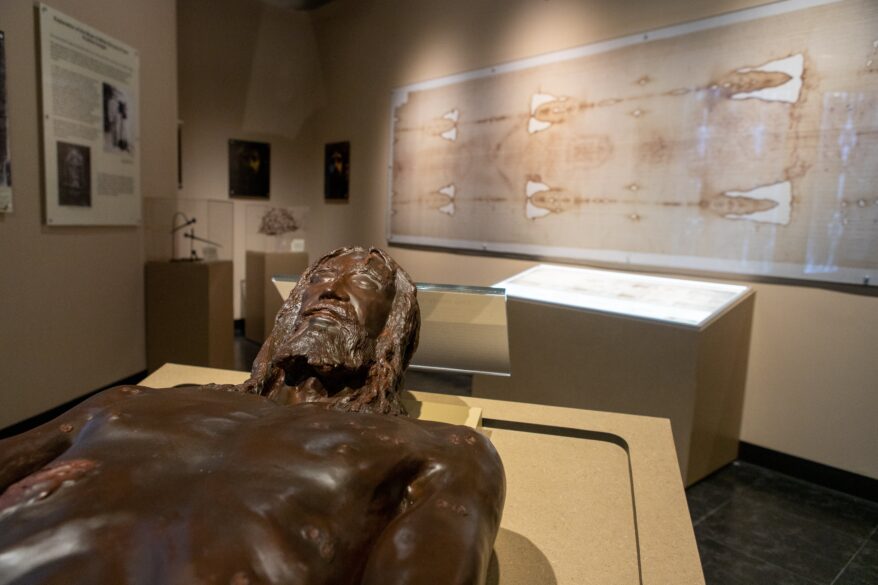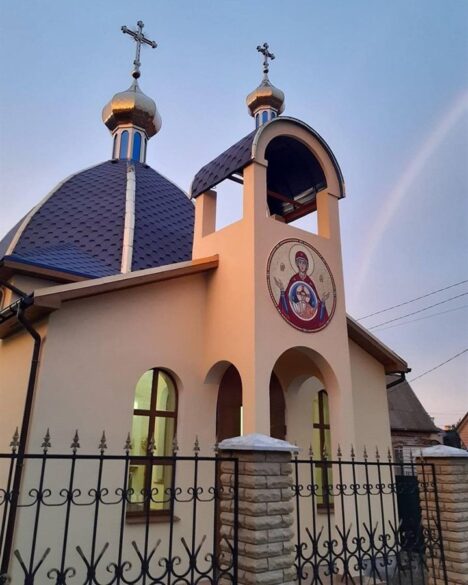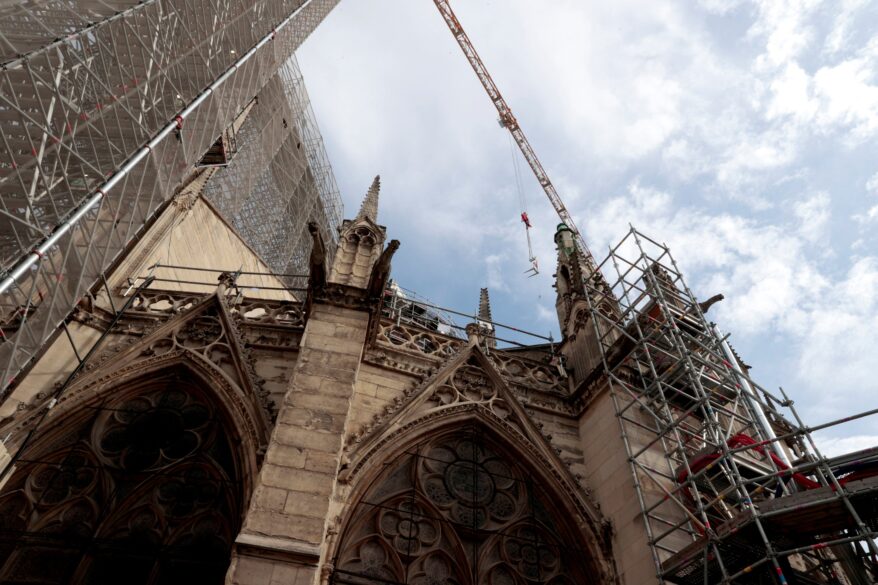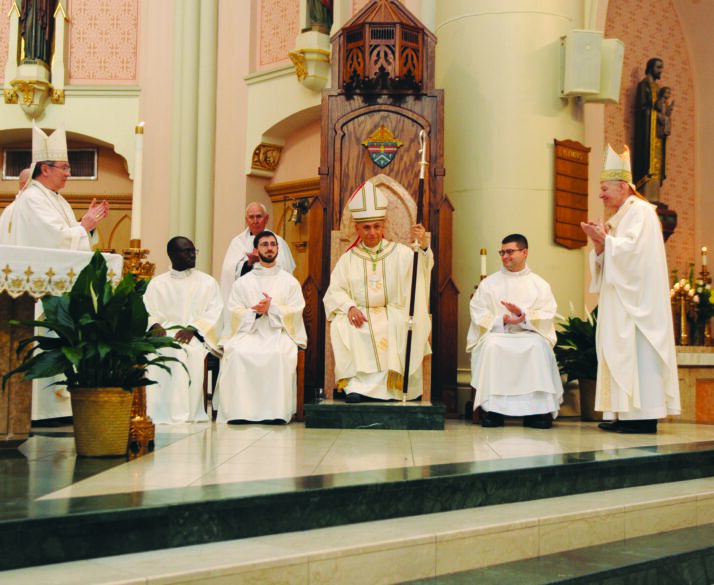NATION
HASBROUCK HEIGHTS, N.J. (OSV News) – For an Archdiocese of Newark deacon who survived the terrorist attacks of Sept. 11, 2001, the real battle – a search for God – began after reaching the ground. Now-Deacon Paul Carris was a 46-year-old civil engineer working in the World Trade Center’s North Tower when al-Qaida hijackers slammed American Airlines Flight 11 into the building. The deacon, who described himself as a rather indifferent Catholic layman at the time, accompanied a fellow floormate with severe health issues down 71 flights of steps to safety, even as the building burned and the South Tower was struck by a second plane. The pair were among the last to safely exit the building before it collapsed. In the following days and weeks after the terrorist attacks, he wrestled with anger and frustration that pointed to an unfulfilled hunger for a deeper relationship with God. Over the years, he immersed himself in faith formation and social outreach, eventually discerning a call to the permanent diaconate. Now assigned to Corpus Christi Parish in Hasbrouck Heights, he told OSV News that surviving 9/11 gave him “a rock of a foundation, knowing that God is here. I have no questions about the reality of God and the reality of God in everybody’s life. But unfortunately, we sometimes have to go through tragedy to wake us up to open that door.”
CHICAGO (OSV News) – St. Jude may be best known in the United States for being the patron saint of St. Jude Children’s Research Hospital in Memphis, a cancer treatment center founded by Lebanese-American entertainer Danny Thomas. Thomas credited St. Jude – also well known among Catholics as the patron saint of hopeless causes and desperate situations – with reviving his career during a particularly low moment. He founded the hospital in gratitude. Now more Catholics are going to learn about this faithful apostle, martyr and saint as his relic – bone fragments from an arm believed to be his – leaves Italy for the first time in centuries, sponsored by the Treasures of the Church ministry, for a tour that extends into May 2024. The tour begins in Chicago on Sept. 9 at St. John Cantius Church. Scheduled stops for the remainder of 2023 include parishes in Illinois, Minnesota, South Dakota and Iowa, followed by Kansas, Iowa, Missouri and Nebraska, Indiana and Michigan. The relic’s tour then veers east to parishes in Ohio and central Pennsylvania – some 45 parishes. There are to be 100 stops in all. The 2024 stops into May have not yet been announced. At each parish, there will be public veneration and special Masses. The detailed St. Jude relic tour schedule is available at apostleoftheimpossible.com.
BALTIMORE (OSV News) – Archbishop William E. Lori told Catholics Sept. 5 that the Archdiocese of Baltimore is considering Chapter 11 bankruptcy reorganization as one option to deal with lawsuits expected to be filed when the state’s Child Victims Act takes effect Oct. 1. The law, passed by the Maryland General Assembly earlier this year, removed any statute of limitations for civil suits involving child sexual abuse. It caps suits against public institutions such as government schools at $890,000, and for private individuals or institutions such as churches at $1.5 million. The previous law allowed such suits for people up to age 38, an increase from the previous age limit of 25. At the time, the Maryland Catholic Conference – which includes the Archdiocese of Baltimore as well as the Archdiocese of Washington and the Diocese of Wilmington, Delaware, which both include Maryland counties – supported the increase to age 38. In his Sept. 5 letter, the archbishop said he has two overarching goals as the archdiocese considers its response: “the healing of victim-survivors who have suffered so profoundly from the actions of some ministers of the church” and “the continuation and furtherance of the many ministries of the Archdiocese that provide for the spiritual, educational, and social needs of countless people – Catholic and non-Catholic – across the state.” The archbishop said he plans to prioritize both goals.
VATICAN
VATICAN CITY (CNS) – If people can learn how to inflict suffering on others with ever more deadly weapons, they also can learn to stop doing so, Pope Francis said. “If we can hurt someone, a relative or friend, with harsh words and vindictive gestures, we can also choose not to do so,” he added. “Learning the lexicon of peace means restoring the value of dialogue, the practice of kindness and respect for others.” Marking International Literacy Day, Pope Francis sent a message to Audrey Azoulay, director-general of UNESCO, encouraging efforts to teach reading and writing to the hundreds of millions of people in the world who do not have basic literacy skills, but he also focused on the education needed to help all people contribute to building sustainable and peaceful societies. The papal message, was published by the Vatican Sept. 8, International Literacy Day.
VATICAN CITY (CNS) – Any limitations and rules regarding media access and communications during the upcoming Synod of Bishops are rooted in the “essence” of a synod and meant to help participants in their process of discernment, said the head of the synod’s communication committee. “The way in which we are going to share information about the synod is very important for the discernment process and for the entire church,” Paolo Ruffini, prefect of the Vatican Dicastery for Communication, told reporters at a Vatican news conference Sept. 8. Some of the “few rules regarding communication” stem from “the essence of the synod,” he said, which Pope Francis has repeatedly underlined is not a “parliament” or convention but a journey of listening and walking together in accordance with the Holy Spirit. However, Ruffini said, some portions of the synod will be livestreamed and open to Vatican accredited reporters: – Mass in St. Peter’s Square Oct. 4 to open the assembly of the Synod of Bishops. – The first general congregation, which begins that afternoon with remarks by Cardinal Mario Grech, secretary-general of the synod, Cardinal Jean-Claude Hollerich, relator general of the synod, and Pope Francis. – The moment of prayer beginning each general congregation. – The opening sessions of each of the five segments or “modules” into which the synod will be divided.
WORLD
MEXICO CITY (OSV News) – Mexico’s Supreme Court has removed abortion restrictions on national level – a decision expanding access to abortion during the first 12 weeks of pregnancy across the country. The high court granted an injunction Sept. 6, requiring federally operated hospitals and health facilities to provide abortion services. The decision also scrapped criminal penalties for physicians and health professionals performing abortions. One of the litigants, the Information Group on Reproductive Choice (known by its Spanish acronym GIRE), called the unanimous court decision “a historic milestone,” as more than 70% percent of Mexican women have access to Mexico’s federal health system. That health system includes the Mexican Social Security Institute – the largest in Latin America which covers salaried workers, along with systems for public employees and the poor. Pro-life groups decried the decision. “It is an attack on the lives of the most defenseless, innocent and vulnerable,” The National Front for the Family said via X, previously known as Twitter, calling the decision “supreme injustice.”
SÃO PAULO (OSV News) – Church activists in the Amazon are worried about the Brazilian government’s plan to exploit oil in a marine area close to the mouth of the Amazon River. Oil drilling, an issue discussed in different meetings over the past months by ecclesial movements and environmentalists, has been a problem in several regions of the Amazon. While there was relevant progress recently in the struggle to restrain the oil companies’ operations in the rainforest, the pressure from those corporations is immense, and it will take much effort from Catholics inspired by Pope Francis’ “Laudato Si’” encyclical to secure the protection ‘ of their “common home” in the Amazon, activists say. The project of exploiting oil about 300 miles northeast from Amazon River’s mouth has put top government officials on opposite sides: On one side is Environment Minister Marina Silva, who argues that technical studies showed that the operation would have a huge impact on the environment and local communities, and on the other is most of President Luiz Inácio Lula da Silva’s cabinet. Lula is himself among the ones who think that it is possible to go on with the project without harming the environment. The plan was among the topics discussed by Lula and the presidents of the other nations of the Pan-Amazon region during an Aug. 8-9 summit in Belem, in Brazil. The region consists of nine countries: Brazil, Bolivia, Colombia, Ecuador, Peru, Venezuela, Suriname, Guiana and French Guiana. “The summit’s final document failed to address key elements concerning extractivism in the Amazon. All decisions should be unanimous and there was no consensus on those issues,” explained Father Dario Bossi, a member of the Integral Ecology and Mining Commission of the bishops’ conference.





